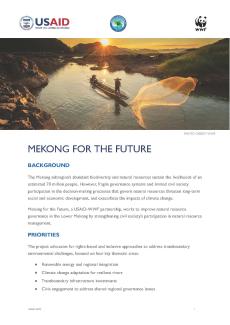BACKGROUND
The Mekong subregion’s abundant biodiversity and natural resources sustain the livelihoods of an estimated 70 million people. However, fragile governance systems and limited civil society participation in the decision-making processes that govern natural resources threaten long-term social and economic development, and exacerbate the impacts of climate change.
Mekong for the Future, a USAID-WWF partnership, works to improve natural resource governance in the Lower Mekong by strengthening civil society’s participation in natural resource management.
PRIORITIES
The project advocates for rights-based and inclusive approaches to address transboundary environmental challenges, focused on four key thematic areas:
- Renewable energy and regional integration
- Climate change adaptation for resilient rivers
- Transboundary infrastructure investments
- Civic engagement to address shared regional governance issues
These technical themes are integrated across these primary work streams:
- Strengthening national, regional, and international stakeholders’ coordination
- Empowering civil society organizations and citizens to take action and advocate for policy developments effectively
KEY RESULTS
During Mekong for the Future’s four years of project implementation, USAID and WWF have:
- Supported the ASEAN Intergovernmental Commission on Human Rights in developing the ASEAN Declaration on the Right to a Clean, Safe, and Sustainable Environment, including the role of project staff as a qualified expert on the ASEAN-led working group.
- Launched Hug Mekong, a transboundary civil society network comprising five organizations in Lao PDR and Thailand. The network collaborates with communities and policymakers on both banks of the Mekong to promote sustainable, resilient, and inclusive management of the river.
- Partnered with the ASEAN Commission for the Promotion and Protection of the Rights of Women and Children (ACWC) to promote gender equality and social inclusion in climate action, highlighting opportunities for future cross-sectoral collaboration in the ten ASEAN member states.
- Facilitated the creation of the Energy Innovation Network, a network of civil society organizations working in clean energy in the five Mekong countries, by collaboratively developing a technical report on regional power trade. The network then presented its policy recommendations to the Ministry of Energy of Thailand.
- Enhanced regional freedom of information and access through an initiative supporting stories and documentaries by environmental journalists through in-person training, virtual webinars, and 35 small grant and mentoring opportunities. Fifty short human-interest stories gained 1.5 million views and earned more than 60,000 engagements on social media.
- Amplified the advocacy efforts of nine civil society organization partners, supporting locally-led initiatives for enhancing the resilience of the Salween and Mekong Rivers, reducing haze in the Golden Triangle, conserving ASEAN heritage, and preserving Indigenous Peoples' landscapes.


